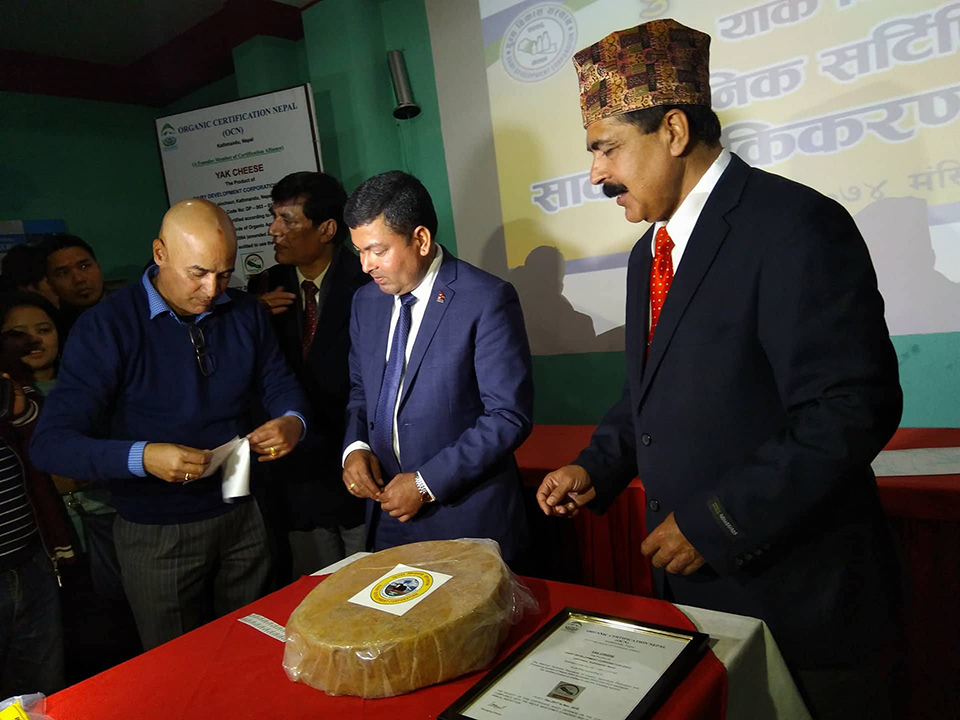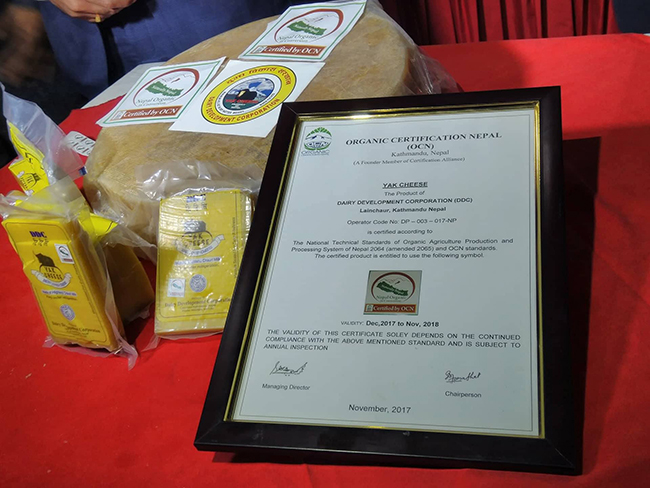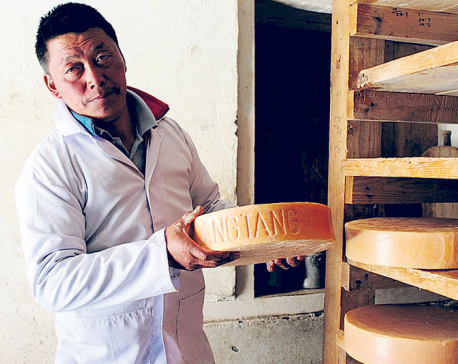
OR
Yak cheese production on the decline
Published On: December 5, 2017 11:35 AM NPT By: Arpana Ale Magar

Production has halved over the past three decades.
KATHMANDU, Dec 5: Production of yak cheese has declined by almost 50 percent over the past three decades.
Three decades ago, Nepal used to produce more than 100s ton of yak cheese annually. But annual production fell down to 55 tons in Fiscal Year 2016/17, according to District Development Corporation (DDC).
Officials of DDC say that the production of yak cheese is declining as the number of yak farmers is decreasing with each passing year. “We are producing only around 55 tons of yak cheese annually, Ishwari Adhikari, the information officer for the DDC, told Republica. “Production of yak cheese started declining after the 1980s. Now, many farmers have left their ancestral profession of yak farming.”
Migration of people from the Himalayan region to hilly and Tarai region has impacted yak farming, according to Adhikari. “Yak farming is a very difficult profession. Farmers have to tend their cattle round the clock and always look for grazing grounds,” he said, adding: “Now, many farmers have shifted to other easier jobs.”
Stating that yak cheese has medicinal and nutritional benefits, Adhikari suggested to the government to introduce programs and incentives for farmers to attract them toward yak farming. “Farmers are not getting good price for yak milk. Realizing this fact, the government should provide them financial and technical support,” he added.
Shyam Prasad Poudel, the spokesperson for the Ministry of Livestock Development, said yak farming is declining despite of several efforts made by concerned government agencies. “We have put lot of efforts for yak preservation. But I must agree that such programs are not becoming much effective,” he said, adding: “Decreasing number of yak farmers, failure to adopt new technology, and lack of programs to encourage farmers toward yak farming are some of the reasons behind this.”
Poudel also said that production of yak milk is not increasing as yak farmers are still following age-old farming methods. “As cost of production of yak milk is high, these farmers cannot compete with farmers rearing cow and buffalo which produce more milk,” he said, adding that the government will accord high priority to yak farming from next year.
Programs launched by the government support farmers to purchase medicines and maintain grazing grounds for their cattle. According to Poudel, the government will start providing farmers grants for the preservation, promotion and production of yak from next year.
The government currently has only one yak farm at Syangboche of Solukhumbu. As part of promoting yak farming in Nepal, the government recently acquired 40 yaks, including cows and bulls, from Tibet for the Syangboche yak farm, Poudel informed. “We will work with local bodies to promote yak farming in the Himalayan region. The government will implement its programs and distribute grants to farmers through the local bodies,” Poudel added.
Yak cheese production started in Nepal in 1952 after a cheese factory was set up in Langtang of Rasuwa with the financial help of World Food Organization and technical support of the Swiss government.
DDC's yak cheese gets organic certification
Yak cheese produced by District Development Corporation (DDC) has received organic certification from Organic Certification Nepal (OCN).
The certification was issued as per the national technical standards of Organic Agriculture Production and Processing System of Nepal 2064 (amended 2065) and OCN standard.
OCN provided certification to DDC yak cheese amid an event organized in Kathmandu on Monday in the presence of representatives of OCN and DDC as well as the Ministry of Agriculture Development and the Ministry of Livestock Development.

Speaking at the program, Umesh Lama of OCN said that orange sticker will be provided to DDC's yak during the trial period. “We will give green sticker later on,” he said, adding: “We will now work to get international certification for yak cheese.”
Once DDC's yak cheese gets international certification, it can be exported to different international markets.
Ishwori Prasad Adhikari, the spokesperson for the DDC said that organic certification is important to promote yak farming and increasing production of yak milk. “Our product will get a good price in the international market, once it receives international certification. Then we will be able to give good price to farmers,” he added.
Dolakha, Ramechhap and Solukhumbu are the leading producers of yak cheese in Nepal.
You May Like This

Cheese production diminishing in Langtang
RASUWA, Aug 2: The production of cheese has been decreasing at the Cheese production center in Gosainkunda rural municipality-4 of... Read More...

Cheese production resumes in Langtang
LANGTANG, Oct 29: Many inhabitants of Langtang village at the base of Mt Langtang lost their lives when the catastrophic earthquake... Read More...

Hotel Yak & Yeti celebrates International Women’s day
KATHMANDU, March 10: On the auspicious occasion of International Women’s day, Hotel Yak & Yeti honored and acknowledged the contribution of... Read More...







Just In
- NRB to provide collateral-free loans to foreign employment seekers
- NEB to publish Grade 12 results next week
- Body handover begins; Relatives remain dissatisfied with insurance, compensation amount
- NC defers its plan to join Koshi govt
- NRB to review microfinance loan interest rate
- 134 dead in floods and landslides since onset of monsoon this year
- Mahakali Irrigation Project sees only 22 percent physical progress in 18 years
- Singapore now holds world's most powerful passport; Nepal stays at 98th











Leave A Comment